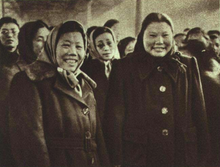Kang Keqing
| Kang Keqing | |
|---|---|
| 康克清 | |

Kang Keqing (right) in 1952 at the International Convention for the Protection of Children
|
|
| Spouse of the Head of State of China (de facto) | |
|
In office 17 January 1975 – 6 July 1976 |
|
| Chairperson of the All-China Women's Federation | |
|
In office 1978–1988 |
|
| Personal details | |
| Born |
Kang Guixiu (Chinese: 康桂秀) 7 September 1911 |
| Died | 22 April 1992 (aged 80) |
| Spouse(s) | Zhu De |
| Parents | Kang Niangou (Chinese: 康年苟) |
Kang Keqing (K'ang K'e-ching; Chinese: 康克清; pinyin: Kāng Kèqīng; September 7, 1911 – April 22, 1992) was a politician of the People's Republic of China, and the wife of Zhu De.
Kang was born to a Hakka fishing family in the village of Luotangwan (Chinese: 罗塘湾乡) Wan'an County, Jiangxi Province. In order to make ends meet, her parents sold five daughters in succession to other families as brides. Kang was given away when she was 40 days old to a tenant farmer called Luo Qigui (Chinese: 罗奇圭). Her future husband had not yet been born at this point and, when the Luo family finally had their child, it was a girl. This child died and Kang was cared for by the Luo family as a daughter; living in a peasant family, Kang was the main source of labour for her adopted parents.
In 1924, the Wan'an County Communist member arrived in Kang's village as part of the Northern Expedition and set-up various activities to promote revolution, including plays and a night-school. The member also promulgated concepts of gender equality and freedom in marriage. At approximately age 14, Kang became a member of the Red Army. She would later promulgate the idea that feudalism, imperialism, and bureaucratic capitalism were the main enemies of the female labourer.
...
Wikipedia
